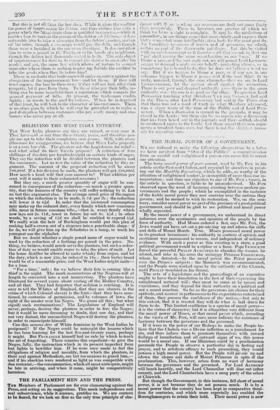RELIEVING THE WEST INDIA INTEREST.
'TnE West India planters say they are ruined, or very near it. They have said so any time these twenty years, and therefore peo- ple are apt to take their complaints cum ,gruiss Still, with every allowance for exaggeration, we believe that West India property is at a very low ebb. The planters ask the Legislature for relief— and what relief do their friends propose? A reduction of four shillings of the duty per hundredweight on certain kinds of sugar. They say the reduction will be divided between the planters and the consumers. Let us test the value of the reduction by this ar- gument. The amount of the proposed reduction will be about 700,000/. If a fair division be made, the planters will get 350,000/. How much a head will that sum amount to? What addition per cent, will it make to their exhausted revenues ?
But they say, a much (Treater quantity of sugar will be con- sumed in consequence of tl3e reduction—so much a greater quan- tity, that the finances of the country will suffer nothing by it. Let us test this argument also. The average retail price of the sugars on which the reduction is to be made, is 7d. per lb.; the reduction will lower it to Gid. In order that the increased consumption may make up the reduced duty, every family which now consumes 5lbs. must in future consume 6lbs.,—that is, every family which now lays out 28. 11d., must in future lay out 3s. 4:d.; in other words, by a saving of lid. we shall be enabled to expend 5el. We really wish the heir of Buckingham would put this plan of making half-a-crown out of a sixpence into a practicable shape : if he do, we will give him up the Schedules in a lump, to teach his youngest son the alphabet. But we doubt whether a single pound more of sugar would be used by the reduction of a farthing per pound in the price. No- thing, we believe, would much serve the planters, but such a reduc- tion of duty as would enable sugar to take the place of malt. Let the home distiller be allowed to make whisky from sugar, and let the duty, which is now 24s., be reduced to 10$.; then barley bread would be of' a reasonable price, and the West Indies might smile— for a time.
"For a time," only ; for we believe their fate is coming like a thief in the night. The mock insurrections of the Negroes will at length be converted into a real insurrection. The planters have blustered for several years about casting off the Mother Country, and all that. They had forgotten that sedition is catching. It is easy to tell the Whites of England, that they are sharers in the crime of which Colonial slavery is the fruit—that they have sanc- tioned, by centuries of permission, and by volumes of laws, the right of the master over his Negro. We grant all this ; but what signify such recriminations? The Legislature of England will never, perhaps, destroy the planters in order to free the Negro; but it would be mere dreaming to doubt, that one day, and that not very distant, the unconciliated Negro will destroy the planters, in order to emancipate himself.
Can this summa dies of White dominion in the West Indies be postponed? If the Negro could be untaught the lessons which he has been learning for the last five-and-twenty years, perhaps it might. But FEINAIGLE himself had no rule by which to teach the art of forgetting. There remains this expedient—to give the Negro, fully, the instruction which in its present imperfect form but lights to bewilder him. If he were once made to feel the obligations of religion and morality, from which the planters, in their zeal against Methodists, are but too anxious to guard him,— and if his shackles were rendered as light as was compatible with due restraint—the consummation, which all must anticipate, might be late in arriving, and when it came, might be comparatively harmless.


























 Previous page
Previous page